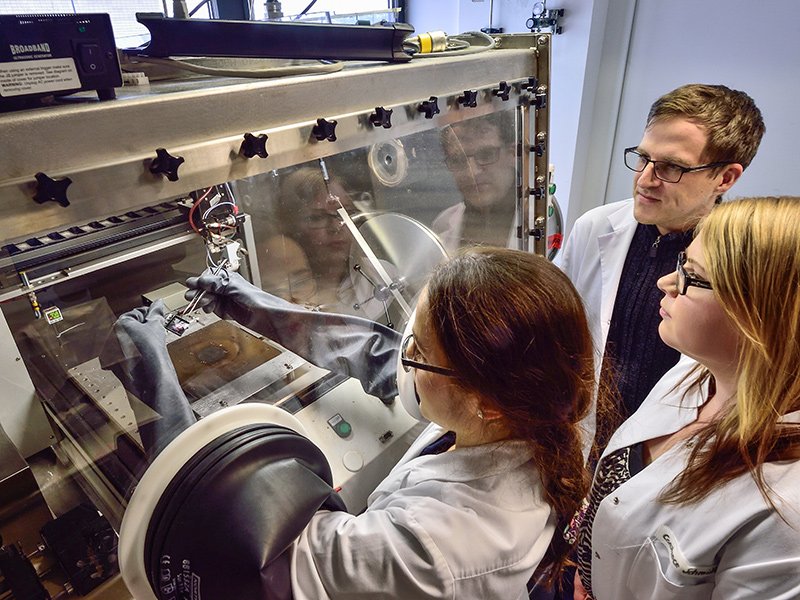AC21 Provides a Platform for Novel Interdisciplinary Research
A workshop supported by “Academic Consortium for the 21st Century” (AC21)initiated new cooperations in the field of organic semiconductors - "AC21 International Forum" provides networks
-

Maria Toma, Constance Schmidt and Dr. Jacek Gasiorowski from the Semiconductor Physics group preparing a spray coating experiment. Dr. Gasiorowski had an active role in establishing the link between the two AC21 members, Chulalongkorn University and TU Chemnitz, and was a member of the organizing committee of the AC21 workshop held in Chemnitz. Photo: Pressefoto Schmidt
It is the vision of "Academic Consortium for the 21st Century" (AC21) to promote the cooperation in education and research between members, bridge between different societies in the world and deliver of wisdom to all people to mutually understand and share values, knowledge and cultures necessary to improve quality of life and to foster co-existence beyond national and regional boundaries in the 21st century. An example of good practice in this direction is provided by the international AC21 workshop "Future perspectives on applications of porphyrin and phthalocyanine derivatives" which was held from 22 to 23 October 2015 in Chemnitz.
The idea for this workshop was born when researchers from two member universities, Prof. Patchanita Thamyongkit (Chulalongkorn University, Thailand) and Prof. Dietrich RT Zahn (Technische Universität Chemnitz) met and discussed their common research interests in organic molecules. While Prof. Thamyongkit is a chemist and an expert in the synthesis of porphyrin and phthalocyanine molecules, Prof. Zahn´s Semiconductor Physics group applies these molecules for applications such as organic spintronics (see also DFG Research Unit 1154 „Towards Molecular Spintronics“). Immediately proposals for joint interdisciplinary projects were discussed and, moreover, other renowned researchers with expertise in the field from other AC21 member universities, namely Prof. Mario Ruben from the University of Strasbourg (France) and Prof. Jonathan Lindsey (North Carolina State University, US) were identified. All agreed instantaneously to participate in a joint activity. The resulting workshop was supported by AC21 and hosted about 50 researchers predominantly from the participating AC21 member universities. The workshop was an excellent platform to discuss the latest research in the field and the possibilities for further joint work. Due to the success of this workshop a follow-up workshop was envisaged and research visits between AC21 members organized. For example Prof. Thamyongkit from Chulalongkorn University will visit TUC again in May 2016 for a couple of weeks with one of her PhD students who will with the help of an "InProTUC" grant conduct experiments for three months in Chemnitz on molecules synthesized in Bangkok.
The workshop was supported by the AC21 Special Project Fund (SPF). The SPF was created in order to bring together members of AC21 Universities, encouraging and introducing new research opportunities, exchange and networking for academics. Event organizers will attempt to include large numbers of researchers, post-doctoral students and graduate students. Events may include mini-symposia, mini-workshops, schooling projects, start-up funds for long term research projects, small international forums, as well as traditional research proposals that attempt to include a wide circle of contacts and participants. The outcome of the AC21 workshop in Chemnitz is very promising for future activities within the AC21 network and the "AC21 International Forum" from 30 April to 3 May 2016 provides further opportunities to strengthen the interaction between AC21 members.
(Authors: Prof. Dr. Dietrich RT Zahn and Jun.-Prof. Georgeta Salvan)
Mario Steinebach
14.04.2016




